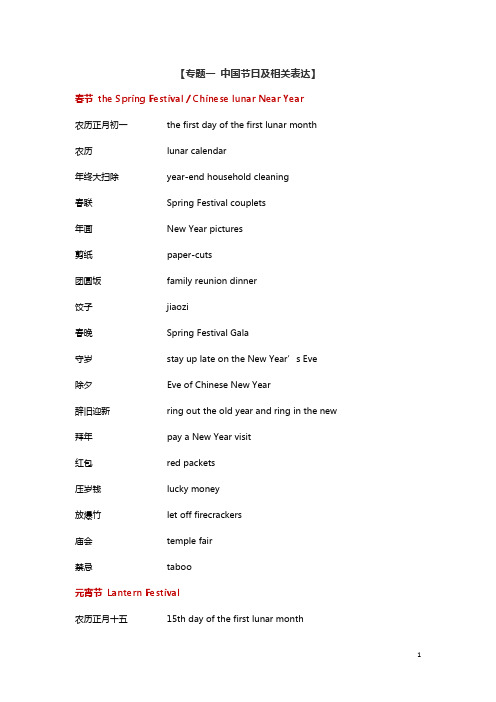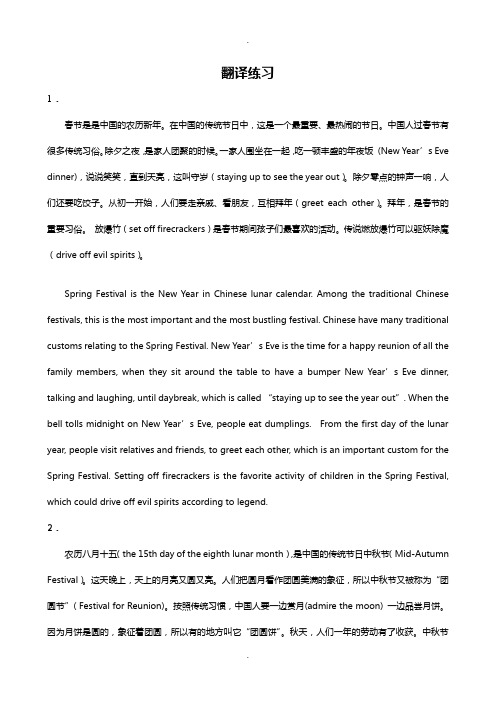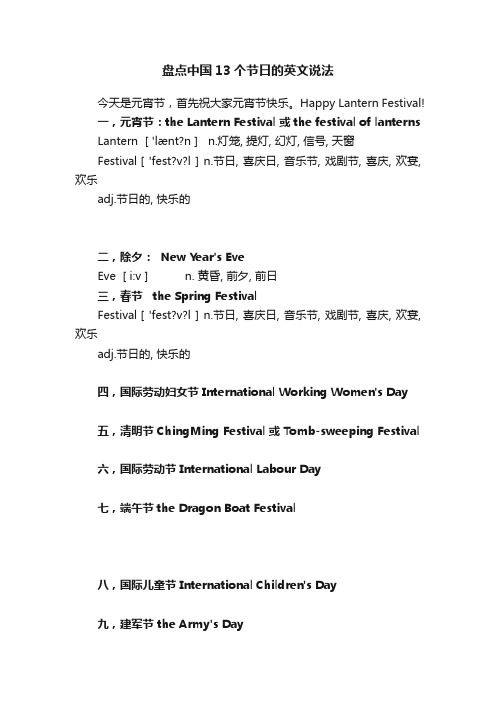大学英语六级翻译传统文化词汇:喜庆节日
4.6级节日翻译

4.6级节日翻译四六级翻译热点词(一)中国节日篇1.春节the Spring Festival / Chinese lunar Near Year农历正月初一the first day of the first lunar month农历lunar calendar年终大扫除year-end household cleaning春联Spring Festival couplets年画New Year pictures剪纸paper-cutting团圆饭family reunion dinner饺子jiaozi春晚Spring Festival Gala守岁stay up late on the New Year’s Eve除夕Eve of Chinese New Year辞旧迎新ring out the old year and ring in the new拜年pay a New Year visit红包red packets /red paper containing money as a gift 压岁钱lucky money放爆竹let off firecrackers庙会temple fair禁忌taboo春节:春节庆祝活动是一年中最重要的庆祝活动。
中国人庆祝春节的方式可能略微不同,但其愿望几乎是相同的,他们希望其家人和朋友来年健康和幸运。
春节庆祝活动通常持续15天。
庆祝活动包括春节的年夜饭,放鞭炮,给儿童压岁钱,春节钟声和春节问候。
大多数中国人将在春节的第7天停止庆祝活动,因为全国性节假通常在这一天结束,但在公共场所的庆祝活动可能最终持续到正月十五。
Chinese New Year Celebration is the most important celebration of the year. Chinese people may celebrate the Chinese New Year in slightly different ways but their wishes are almost the same; they want their family members and friends to be healthy and lucky during next year.Chinese New Year Celebration usually lasts for 15 days. Celebratory activities include Chinese New Feast, firecrackers, giving lucky money to children, the New Year bell ringing and Chinese New Year Greetings. Most of Chinese people will stop the celebrating in their home on the 7th day of New Year because the national holiday usually ends around that day, however celebration s in public areas can last until the 15th day of New Year.3. 清明节Tomb-sweeping Day寒食节Cold Food Festival祭拜祖先offer sacrifices to one’s ancestors扫墓sweep graves of one’s ancestors or loved ones踏青go for a spring outing清明节:清明节的习俗是丰富有趣的,除了讲究禁火、扫墓,还有踏青、荡秋千、蹴鞠、打马球、插柳等一系列风俗体育活动。
大学英语四六级翻译高频词汇:节日篇(1)

大学英语四六级翻译高频词汇:节日篇 元旦New Year's Day 情人节Valentine's Day 国际妇女节International Women' Day 植树节Tree Planting Day 愚人节April Fools' Day 国际劳动日International Labor Day 中国青年节 Chinese Youth Day 国际儿童节International Children's Day 中国共产党成立纪念日 Anniversary of the Founding of the Communist Party of China 中国人民解放军建军节Army Day 中华人民共和国国庆节National Day 中国教师节Teacher's Day 万圣节Halloween 母亲节Mother's Day 农历正月初一春节(the Spring Festival) 农历正月十五元宵节(Lantern Festival) 农历五月初五端午节(the Dragon-Boat Festival) 农历七月初七乞巧节(中国情人节)(Double-Seventh Day) 农历八月十五中秋节(the Mid-Autumn Festival) 农历九月初九重阳节(the Double Ninth Festival) 农历腊月初八腊八节(the laba Rice Porridge Festival) 春联 Spring Festival couplets 年画 New Year pictures 剪纸paper-cuts 除夕 the eve of the lunar New Year 守岁 stay up late on the New Year’s Eve 放爆竹 let off firecrackers 拜年 pay a New Year visit 团圆饭 family reunion dinner 敬酒 propose a toast 红包 red packets (cash wrapped up in red paper) 舞狮 lion dance 舞龙 dragon dance 灯笼 lantern 灯谜 riddles written on lanterns 灯会 exhibit of lanterns 禁忌 taboo 压岁钱 gift money; money given to children as a lunar new year gift 祭祖宗 offer sacrifices to one’s ancestors 元宵 rice dumpling 踩高跷 stilt walking 扭秧歌 yangge dance 扫墓 sweep graves of one’s ancestors or loved ones 赛龙舟 dragon-boat racing 粽子zongzi (sticky rice dumpling wrapped in reed or bamboo leaves) 月饼 moon cake 赏月 appreciate the glorious full moon 赏菊 admire the beauty of chrysanthemum 登高 climb mountain。
英语四六级翻译常用词汇:传统节日

英语四六级翻译常用词汇:传统节日庆祝传统节日也是传承民族文化的一种,下面是店铺整理的英语四六级翻译常用词汇:传统节日,希望对大家有用,更多消息请关注应届毕业生网。
十二生肖the twele Chinese zodiac signs本命年one's year of birth considered in relation to the 12 Terrestrial Branches传统节日traditional holidays春节the Spring Festival元宵节the Lantern Festival (15th day of the first lunar month)清明节the Pure Brightness Festival / the Tomb-sweeping Day (April the 5th)端午节the Dragon Boat Festival (5th of the fifth lunar month)中秋节the Moon Festival / the Mid-Autumn Day (15th of the eight lunar month)重阳节the Double Ninth Day / the Aged Day农历七月初七乞巧节 (中国情人节)(Double-Seventh Day)农历腊月初八腊八节 (the laba Rice Porridge Festival)【拓展阅读】英语四级词汇:巧记单词积累技巧规律一:发音是重要的,规律是可循的。
其实很多同学在记忆单词的过程中已经发现这个规律了,但是可能没有时间静下心来好好总结,没关系,在这里,我们可以重新审视一下这个规律。
一般来说,英语单词的读音是非常重要的,而且也是很有规律的,也就是说,某一些特定的字母或者字母组合,往往都是发某个特定的或某一组特定的音,举个例子:competition,emotion,addition,ambition,creation,relation等等这样的词,我们读一遍就会发现,这些名词都有着相同的词尾-tion,而且这个词尾都无一例外地发/ ∫n/,这就给我们一个提示,如果遇到一些名词是以/ ∫n/结尾的话,那么它的词尾很有可能就是-tion,这样的话,我们的记忆就从一个一个的字母上升到了一个字母组合,而产生这些字母组合的原因,就是因为相同的发音。
四六级翻译热点词·中国节日篇

【专题一中国节日及相关表达】春节the Spring Festival / Chinese lunar Near Year农历正月初一the first day of the first lunar month农历lunar calendar年终大扫除year-end household cleaning春联Spring Festival couplets年画New Year pictures剪纸paper-cuts团圆饭family reunion dinner饺子jiaozi春晚Spring Festival Gala守岁stay up late on the New Year’s Eve除夕Eve of Chinese New Year辞旧迎新ring out the old year and ring in the new 拜年pay a New Year visit红包red packets压岁钱lucky money放爆竹let off firecrackers庙会temple fair禁忌taboo元宵节Lantern Festival农历正月十五15th day of the first lunar month元宵rice dumplings花灯festival lantern灯谜lantern riddle灯会exhibit of lanterns烟花fireworks端午节Dragon Boat Festival农历五月初五5th of the fifth lunar month粽子zongzi糯米sticky rice粽叶bamboo leaves舞龙dragon dance舞狮lion dance踩高跷stilt walking赛龙舟dragon-boat racing纪念in memory of屈原Quyuan诗人poet忠臣loyal minister清明节Tomb-sweeping Day寒食节Cold Food Festival祭拜祖先offer sacrifices to one’s ancestors扫墓sweep graves of one’s ancestors or loved ones踏青go for a spring outing中秋节Mid-Autumn Day / Moon Festival农历八月十五15th of the eighth lunar month月饼moon cake赏月appreciate the glorious full moon中国神话故事Chinese mythology嫦娥Chang’e后羿Hou Yi长生不老be immortal重阳节Double Ninth Day赏菊admire the beauty of chrysanthemum 登高climb a height七夕节Double Seventh Day/Chinese Valentine's Day银河the Milky Way鹊桥bridge of magpies牛郎Cowherd织女the Weaving Maid王母娘娘the Queen of Heaven乞巧praying-for-cleverness女红needlework。
四六级中国文化翻译

翻译练习1.春节是是中国的农历新年。
在中国的传统节日中,这是一个最重要、最热闹的节日。
中国人过春节有很多传统习俗。
除夕之夜,是家人团聚的时候。
一家人围坐在一起,吃一顿丰盛的年夜饭(New Year’s Eve dinner),说说笑笑,直到天亮,这叫守岁(staying up to see the year out)。
除夕零点的钟声一响,人们还要吃饺子。
从初一开始,人们要走亲戚、看朋友,互相拜年(greet each other)。
拜年,是春节的重要习俗。
放爆竹(set off firecrackers)是春节期间孩子们最喜欢的活动。
传说燃放爆竹可以驱妖除魔(drive off evil spirits)。
Spring Festival is the New Year in Chinese lunar calendar. Among the traditional Chinese festivals, this is the most important and the most bustling festival. Chinese have many traditional customs r elating to the Spring Festival. New Year’s Eve is the time for a happy reunion of all the family members, when they sit around the table to have a bumper New Year’s Eve dinner, talking and laughing, until daybreak, which is called “staying up to see the year out”. When the bell tolls midnight on New Year’s Eve, people eat dumplings. From the first day of the lunar year, people visit relatives and friends, to greet each other, which is an important custom for the Spring Festival. Setting off firecrackers is the favorite activity of children in the Spring Festival, which could drive off evil spirits according to legend.2.农历八月十五(the 15th day of the eighth lunar month),是中国的传统节日中秋节(Mid-Autumn Festival)。
盘点中国13个节日的英文说法

盘点中国13个节日的英文说法
今天是元宵节,首先祝大家元宵节快乐。
Happy Lantern Festival!
一,元宵节:the Lantern Festival 或the festival of lanterns Lantern [ 'lænt?n ] n.灯笼, 提灯, 幻灯, 信号, 天窗
Festival [ 'fest?v?l ] n.节日, 喜庆日, 音乐节, 戏剧节, 喜庆, 欢宴, 欢乐
adj.节日的, 快乐的
二,除夕: New Year's Eve
Eve [ i:v ] n. 黄昏, 前夕, 前日
三,春节 the Spring Festival
Festival [ 'fest?v?l ] n.节日, 喜庆日, 音乐节, 戏剧节, 喜庆, 欢宴, 欢乐
adj.节日的, 快乐的
四,国际劳动妇女节 International Working Women's Day
五,清明节 ChingMing Festival 或 Tomb-sweeping Festival 六,国际劳动节 International Labour Day
七,端午节the Dragon Boat Festival
八,国际儿童节 International Children's Day
九,建军节 the Army's Day
十,中秋节 Mid-autumn Festival 十一,教师节 Teachers' Day
十二,重阳节 Double ninth festival 十三,国庆节 National Day。
中国传统文化英语翻译
45.京剧:BeijingOpera/PekingOpera
46.秦腔:CryingofQinPeople/QinOpera
47.太极拳:Tai Chiﻫ48.独生子女证:TheCertificate ofOne-child
64.香港澳门同胞:CompatriotsfromHongKong andMacao
65.文化大革命:Cultural Revolution
66.长江中下游地区:TheMid-lowReaches of Yangtze Riverﻫ67.门当户对:PerfectMatch/Exact Match
68.《水浒》:Water Margin/Outlaws of the Marsh
49.天坛:AltarofHeaveninBeijingﻫ50.小吃摊:Snack Bar/SnackStand
51.红双喜:Double Happinessﻫ52.政治辅导员:Political Counselor/SchoolCounselor
53.春卷:SpringRoll(s)
54.莲藕:LotusRootﻫ55.追星族:StarStruckﻫ56.故宫博物院:ThePalace Museumﻫ57.相声:Cross-talk/ComicDialogue
一、对龙图腾他的崇拜在中国大约已绵延了八千多年。中国龙是古人将鱼、蛇、马、牛等动物与云雾、雷电等自然天象集合而成的一种神物。中国龙的形成与中华民族的多元融合过程同步。在中国人的心目中,龙具有振奋腾飞、开拓变化的寓意和团结凝聚的精神。ﻫChineseDragonDragon totem worship inChinahasbeenaroundfor the last 8,000years.Theancients inChina consideredthe dragon (or loong)afetish thatcombinesanimalsincluding the fish,snake,horseandox withcloud,thunder,lightning and other natural celestialphenomena.TheChinesedragonwas formedin accordance withthe multiculturalfusionprocess of theChinesenation. To the Chinese,thedragonsignifiesinnovationandcohesion.ﻫ二、秧歌舞是中国汉族的一种民间传统舞蹈,通常在北方省份表演。秧歌舞者通常穿上明亮多彩的表演服装,他们的表演动作有力迅速。在农历春节、元宵节等节日期间,人们一旦听到锣鼓声,不管外面天气有多冷,他们都会蜂拥到街上看秧歌舞表演。近年来,中国东北某些城市的老年人自发组织了了秧歌队,队员常年通过跳秧歌舞来保持健康,同事他们也乐在其中。
大学英语六级翻译常用词汇之中国文化
大学英语六级翻译常用词汇之中国文化【中国文化常见翻译】阳历Solar calendar阴历Lunar calendar闰年leap year十二生肖zodiac春节the Spring Festival元宵节the Lantern Festival清明节the Tomb-sweeping Day端午节the Dragon-boat Festival中秋节the Mid-autumn Day重阳节the Double-ninth Day七夕节the Double-seventh Day春联spring couplets庙会temple fair爆竹firecracker年画New Year pictures压岁钱New Year gift-money舞龙dragon dance元宵sweet sticky rice dumplings花灯festival lantern灯谜lantern riddle舞狮lion dance踩高跷stilt walking赛龙舟dragon boat race胡同hutong山东菜Shandong cuisine川菜Sichuan cuisine粤菜Canton cuisine扬州菜Yangzhou cuisine月饼moon cake年糕rice cake油条deep-fried dough sticks 豆浆soybean milk馒头steamed buns花卷steamed twisted rolls 包子steamed stuffed buns 北京烤鸭Beijing roast duck 拉面hand-stretched noodles 馄饨wonton豆腐tofu? bean curd麻花fried dough twist烧饼clay oven rolls皮蛋100-year egg; century egg蛋炒饭fried rice with egg糖葫芦tomatoes on sticks火锅hot pot长城the Great Wall of China烽火台beacon tower秦士台皇陵the Mausoleum of Emperor Qinshihuang 兵马俑Terracotta Warriors and Horses大雁塔Big Wild Goose Pagoda丝绸之路the Silk Road敦煌莫高窟Mogao Grottoes华清池Huaqing Hot Springs五台山Wutai Mountain九华山Jiuhua Mountain蛾眉山Mount Emei泰山Mount Tai黄山Mount Huangshan; the Yellow Mountain故宫the Imperial Palace天坛the Temple of Heaven午门Meridian Gate大水道Grand Canal护城河the Moat【中国文化常见翻译】阳历Solar calendar阴历Lunar calendar闰年leap year十二生肖zodiac春节the Spring Festival元宵节the Lantern Festival清明节the Tomb-sweeping Day 端午节the Dragon-boat Festival 中秋节the Mid-autumn Day重阳节the Double-ninth Day七夕节the Double-seventh Day 春联spring couplets庙会temple fair爆竹firecracker年画New Year pictures压岁钱New Year gift-money舞龙dragon dance元宵sweet sticky rice dumplings 花灯festival lantern灯谜lantern riddle舞狮lion dance踩高跷stilt walking赛龙舟dragon boat race胡同hutong山东菜Shandong cuisine川菜Sichuan cuisine粤菜Canton cuisine扬州菜Yangzhou cuisine月饼moon cake年糕rice cake油条deep-fried dough sticks豆浆soybean milk回音壁Echo Wall居庸关Juyongguan Pass九龙壁the Nine Dragon Wall黄帝陵the Mausoleum of Emperor Huangdi 十三陵the Ming Tombs苏州园林Suzhou gardens西湖West Lake九寨沟Jiuzhaigou Valley日月潭Sun Moon Lake布达拉宫Potala Palace鼓楼drum tower四合院quadrangle; courtyard complex孔庙Confucius Temple乐山大佛Leshan Giant Buddha十八罗汉the Eighteen Disciples of the Buddha喇嘛Lama转世灵重reincarnated soul boy 中药traditional Chinese medicine《黄帝内经》Emperor Huangdi,s Canon of Traditional Chinese Medicine《神农本草经》Shennong,s Herbal Classic《本草纲目》Compendium of Materia Medica针灸acupuncture推拿medical massage切脉feeling the pulse五禽戏five-animal exercises旧石器时代the Paleolithic Age新石器时代the Neolithic Age; New Stone Age母系氏族社会matriarchal clan society封建的feudal。
英语四六级中国主要传统文化名称翻译
中国节日的英语翻译元旦New Year's Day Jan.1国际劳动妇女节International Working women's Day(Women's Day)Mar.8国际劳动节International Labor Day(May. Day) May.1中国青年节Chinese Youth Day May.4国际儿童节International Children's Day(Children's Day)June .1中国共产党诞生纪念日(党的生日) Anniversary of the Founding of the Chinese Communist Party(the Party' s Birthday) July .1建军节Army Day August .1教师节Teachers’ Day Sept.1国庆节National Day October.1中国传统节日春节the Spring Festival (New Year’s Day of the Chinese lunar calendar)农历正月初一元宵节(灯节)the Lantern Festival 农历正月十五清明节the Qingming Festival Tomb-Sweeping Day四月五日前后端午节the Dragon-Boat Festival农历五月初五中秋节the Mid-Autumn Festival (the Moon Festival)农历八月十五重阳节the Double-Ninth Day农历九月初九情人节the Double-Seventh Day农历七月初七中国古代独特事物(Unique Ancient Chinese Items)宣纸 rice paper衙门 yamen叩头 kowtow孔子Confucius牌楼 pailou;pai-loo武术 wushu(Chinese Martial Arts)功夫 kungfu ;kung fu中庸 the way of medium (cf. Golden Means)中和 harmony (zhonghe)孝顺 to show filial obedience孝子 dutiful son家长 family head三纲:君为臣纲,父为子纲,夫为妻纲 three cardinal guides: ruler guides subject, father guides son husband guides wife五常:仁、义、理、智、信 five constant virtues: benevolence (humanity), righteousness, propriety, wisdom and fidelity八股文 eight-legged essays多子多福:The more sons/children, the more blessing/ great happiness养儿防老:raising sons to support one in one’s old age中国独特的传统饮食(Unique Traditional Chinese Foods)馄饨 wonton锅贴 guotie (fried jiaozi)花卷 steamed twisted rolls套餐 set meal盒饭 box lunch; Chinese take-away米豆腐 rice tofu米粉 rice noodles冰糖葫芦 a stick of sugar-coated haws (or apples,etc.)火锅 chafing dish八宝饭 eight-treasure rice pudding粉丝 glass noodles豆腐脑 jellied bean curd风水:Fengshui; geomantic omen阳历:solar calendar阴历:lunar calendar闰年:leap year十二生肖:zodiac春联:spring couplets春运:the Spring Festival travel把中国的汉字“福”字倒贴在门上(听起来像是福到)预示新年有好运:turn the Chinese character for luck (fu) upside down to make “dao”(which sounds like arrival) and put it on your door to bring in good fortune for the new year庙会:temple fair爆竹:firecracker年画:(traditional) New Year pictures压岁钱:New Year gift-money舞龙:dragon dance舞狮:lion dance元宵:sweet sticky rice dumplings花灯:festival lantern灯谜:lantern riddle食物对于中国佳节来说至关重要,但甜食对于农历新年特别重要,因为他们能让新的一年更加甜蜜。
关于我国传统节日祝福的英语单词短语
关于我国传统节日祝福的英语单词短语全文共3篇示例,供读者参考篇1Traditional Chinese festivals are an important part of Chinese culture and history. These festivals are not only occasions for family reunions and celebrations but also have deep cultural and historical significance. As such, sending blessings and well wishes during these festivals is a common practice among Chinese people. Here are some common phrases and greetings used to express blessings during traditional Chinese festivals:1. Spring Festival (Chinese New Year):- Gong Xi Fa Cai (恭喜发财) - Wishing you prosperity and wealth- Xin Nian Kuai Le (新年快乐) - Happy New Year- Shen Ti Jian Kang (身体健康) - Wishing you good health- Wan Shi Ru Yi (万事如意) - May all your wishes come true2. Mid-Autumn Festival:- Zhong Qiu Kuai Le (中秋快乐) - Happy Mid-Autumn Festival- Yuan Man De Yuan (圆满的愿) - May your wishes come true- Yue Bing Tian Tian Xi (月饼甜甜蜜) - Enjoy sweet mooncakes3. Dragon Boat Festival:- Duan Wu Jie Kuai Le (端午节快乐) - Happy Dragon Boat Festival- Zong Zi Mei Wei (粽子美味) - Delicious rice dumplings- Long Zhen Gui Xiang (龙舟归香) - Safe return of the dragon boat4. Qingming Festival:- Qing Ming Bu Yao Leng Bing (清明不要冷饼) - Wish you no cold cakes during Qingming Festival- Ming Feng Shan E (明风山蓄) - Bright and calm weather- Sheng Wei Zhu Fo (生为猪佛) - May you be blessed with good fortune and happiness5. Lantern Festival:- Yuan Xiao Jie Kuai Le (元宵节快乐) - Happy Lantern Festival- Deng Long Huan Xiao (灯笼欢笑) - Lanterns bring joy- Zhu Ren Deng Long (祝人灯笼) - Blessings to all with lanternsThese are just a few examples of the many blessings and well wishes exchanged during traditional Chinese festivals. Sending these phrases to loved ones and friends is a way to show care and respect, and to spread joy and happiness during these special occasions. So next time you celebrate a traditional Chinese festival, remember to share these blessings and spread the festive spirit!篇2Traditional Chinese festivals are an integral part of Chinese culture and heritage, with each festival carrying its own unique customs, symbols, and significance. These festivals are not only occasions for family gatherings and feasting but also opportunities for expressing well wishes and blessings to loved ones. In this article, we will explore some common traditional festival greetings and blessings in China.1. Spring Festival (Chinese New Year):- "恭喜发财" (gōng xǐ fā cái): Wishing you prosperity and wealth.- "万事如意" (wàn shì rú yì): May all your wishes come true.- "身体健康" (shēn tǐ jiàn kāng): Wishing you good health.2. Lantern Festival:- "元宵节快乐" (yuán xiāo jié kuài lè): Happy Lantern Festival.- "团圆幸福" (tuán yuán xìng fú): Wishing you ha ppiness and family reunion.3. Mid-Autumn Festival:- "中秋快乐" (zhōng qiū kuài lè): Happy Mid-Autumn Festival.- "月圆人圆" (yuè yuán rén yuán): May the moon be full, and your family complete.4. Dragon Boat Festival:- "端午安康" (duān wǔ ān kān g): Wishing you health and well-being on the Dragon Boat Festival.- "粽情粽意" (zòng qíng zòng yì): Sending you warm wishes and blessings.5. Double Ninth Festival:- "重阳快乐" (zhòng yáng kuài lè): Happy Double Ninth Festival.- "长寿福寿" (cháng shòu fú shòu): Wishing you a long and blessed life.6. Qingming Festival:- "清明祭扫" (qīng míng jì sǎo): Paying respects and honoring ancestors on Qingming Festival.- "平安健康" (píng ān jiàn kāng): Wishing you peace and good health.7. Winter Solstice Festival:- "冬至快乐" (dōng zhì kuài lè): Happy Winter Solstice Festival.- "团圆温馨" (tuán yuán wēn xīn): Wishing you warmth and family reunion.These are just a few examples of the festive greetings and blessings exchanged during traditional Chinese festivals. Each greeting carries with it the heartfelt wishes and hopes of the sender for the well-being, happiness, and prosperity of the recipient. In a culture that places great emphasis on filial piety, respect for ancestors, and harmony within the family, these greetings serve as a way to express love, gratitude, and good wishes to those we care about. So, the next time you celebrate a traditional Chinese festival, remember to share these greetings and blessings with your loved ones to spread joy and happiness.篇3In China, traditional festivals are an important part of the country's rich cultural heritage. These festivals are often celebrated with various customs, activities, and rituals that have been passed down from generation to generation. One of the key aspects of these festivals is the exchange of blessings and well-wishes between family members, friends, and loved ones.During Chinese New Year, also known as the Spring Festival, people commonly exchange phrases such as "恭喜发财" (gōng xǐ fā cái), which means "wishing you prosperity", and "万事如意" (wàn shì rú yì), which means "may all your wishes come true". These phrases are often written on red paper and displayed in homes or sent in greeting cards to convey good wishes for the coming year.During the Mid-Autumn Festival, people often exchange greetings such as "中秋快乐" (zhōng qiū kuài lè), which means "happy Mid-Autumn Festival", and "团圆幸福" (tuán yuán xìng fú), which means "family reunion and happiness". These phrases are often shared over mooncakes, a traditional delicacy eaten during the festival.During the Dragon Boat Festival, people exchange greetings such as "端午安康" (duān wǔ ān kāng), which means "peace and health on the Dragon Boat Festival", and "龙舟竟渡" (lóng zhōu jìng dù), which means "may the dragon boat race be successful". These greetings are often shared over zongzi, a sticky rice dish wrapped in bamboo leaves.Throughout the year, there are many other traditional festivals in China, each with its own unique customs and rituals for exchanging blessings and well-wishes. Whether it's the Lantern Festival, Qingming Festival, or Double Ninth Festival, the spirit of sending positive vibes and good intentions to others remains a cherished part of Chinese culture.In addition to spoken greetings, people also exchange gifts and tokens of goodwill during traditional festivals in China. These gifts are often symbolic and carry special meanings that signify good luck, prosperity, and happiness for the recipient. From red envelopes filled with money during Chinese New Year to lucky bamboo plants for longevity and fortune, these gifts are a way to show care and thoughtfulness towards others.Overall, the exchange of blessings and well-wishes during traditional festivals in China plays a significant role in fostering positive relationships, building community spirit, and spreadingjoy and happiness among friends and family. It is a beautiful tradition that reflects the values of unity, harmony, and love that are cherished in Chinese culture. So, the next time you celebrate a traditional festival in China, remember to share some kind words and good wishes with those around you. Who knows, your blessings may just come true!。
